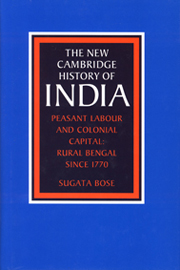Introduction
Published online by Cambridge University Press: 28 March 2008
Summary
In 1978 Eric Stokes, the doyen of agrarian historians at Cambridge, welcomed ‘the return of the peasant to South Asian history’. He berated historians and political scientists for their ‘laggardliness’ in recognizing that ‘the balance of destiny in South Asia rests in peasant hands’ but expressed satisfaction that ‘among the students of the colonial revolution in South Asia the city slickers [we]re at last quitting town’. The difficulties in achieving a meaningful intellectual engagement with peasant history stemmed partly from the misperception of a discontinuity between state structures and politics on the one hand and agrarian economies and societies on the other that had been one of the most lasting legacies of nineteenth-century theorists and comparative sociologists. Besides, there was the vexing problem of sources associated with studying social groups who left few written records of their own and were mere objects in the enquiries of external observers, especially colonial officialdom. During the 1970s and 1980s new empirical research and innovative methodologies enabled not only an historical reconstruction of agrarian economy, society and politics and their interrelations in various regions of colonial India but, through a critical evaluation if not deconstruction of colonial texts, restored to the peasantry their subjecthood in the making of history.
A study of the historical experience of the labouring classes in the Indian countryside during colonial rule is of vital importance and general relevance to historians in two ways. First, the nature and extent of the ‘colonial revolution’ in South Asia cannot be grasped without addressing the question of agrarian transformation.
Information
- Type
- Chapter
- Information
- Peasant Labour and Colonial CapitalRural Bengal since 1770, pp. 1 - 7Publisher: Cambridge University PressPrint publication year: 1993
References
Accessibility standard: Unknown
- 1
- Cited by
